HIGHLIGHTS: JULY 26, 2024
• APEP talks offer nontariff barrier opportunities
• Morris speaks at House Ag Trade Caucus
• FMC issues final ruling on ocean carriers’ refusal to deal or negotiate
• USDEC shares perspective with FFA leaders
• USDEC advances solutions to address container break-ins
• Member opportunity: how to reserve meeting space at U.S. CDE
• China extends tariff exemption on permeate
• U.S. dairy ingredient workshops in Mexico
• Harden talks dairy at UGA
• Four U.S. dairy ingredient activities on tap for China
• Market Summary: Chinese dairy imports fall again in June
• Download the latest International Demand Analysis
• Almarai eyes exports
• Companies explore feed additives for methane reduction
• Company news: FrieslandCampina, Capsa Foods, Yili
Featured
USDEC urges dairy trade priorities in APEP talks
USDEC and NMPF filed joint comments on July 22 with the Office of the U.S. Trade Representative (USTR) on the Americas Partnership for Economic Prosperity (APEP). Announced in June 2022 by President Biden, APEP aims to further develop economic cooperation among 12 participating countries—Barbados, Canada, Chile, Colombia, Costa Rica, Dominican Republic, Ecuador, Mexico, Panama, Peru, Uruguay and the U.S.—to deepen collaboration and integration and make the region more capable of addressing modern challenges, like climate change.
Work is proceeding along three tracks: trade, finance and foreign affairs. The APEP trade track seeks to “bolster the foundations of our regional competitiveness by building upon our existing trade links and economic cooperation,” the White House announced at a 2023 APEP leaders’ summit.
USTR called for comments on the trade track in June.
No backsliding
USDEC and NMPF’s submission reiterates the organizations’ strong preference for comprehensive free trade agreements (FTAs) that establish long-lasting reductions in tariff and nontariff trade barriers. They also acknowledge that APEP is not that kind of deal.
In that light, USDEC and NMPF stressed that the United States’ existing FTAs with Latin America have worked well to date and urged that APEP discussions do not result in backsliding on the existing provisions of those deals.
“It is vital that APEP does not modify the existing tariff, tariff rate quota (TRQ) and safeguard terms in our existing FTAs,” the comments note. APEP is “not a renegotiation of tariff market access terms.”
Tackling nontariff barriers
Instead, the U.S. APEP approach should focus on improving nontariff market access in both FTA countries and countries where the U.S. lacks trade deals. “APEP can make a significant contribution to advancing U.S. dairy market access priorities through commitments that address specific existing barriers and the potential for others to adopt similar barriers,” USDEC and NMPF said.
The comments went on to cite specific existing trade concerns in Canada (dairy TRQ allocations), Colombia (the new countervailing duty investigation, see Global Dairy eBrief, 7/19/24), Costa Rica (dairy facility registration), Ecuador (import licenses) and Mexico (product standards and related conformity assessments), as well as common name protections across the region.
USDEC would welcome broad commitments in APEP in areas like sanitary and phytosanitary (SPS) barriers and technical barriers to trade (TBT). The ultimate goal would be recognition of the safety of the U.S. dairy system, mirroring the broad terms in the U.S.-Panama exchange of letters regarding processed foods (expressly including dairy). As the parties work toward such a “gold standard,” they could agree on interim measures, the comments note. Those include a standard AMS sanitary export certificate, exemption from facility registration, streamlined product registration and prohibiting discriminatory restrictions that limit marketing of formulated milk products.
APEP trade ministers met virtually in March. The next in-person trade track ministerial meeting takes place Aug. 1-2 in Quito, Ecuador.
Reinforcing to Congress the value, benefits of dairy trade
Shawna Morris represented USDEC and NMPF at a House Agricultural Trade Caucus briefing for Congressional staff on July 22, underscoring the critical role of trade for U.S. dairy and agriculture. She was joined by representatives from the American Soybean Association, the North American Blueberry Council, and the National Grain and Feed Association. The event drew over 60 congressional staff in the inaugural briefing for the Caucus that NMPF helped launch in January.
Morris emphasized the benefits of market-opening trade agreements for the U.S. dairy industry and called for more proactive Congressional engagement in trade policy. She highlighted the growing tariff disadvantages faced by U.S. dairy exporters as trade competitors—namely the EU and New Zealand—continue to pursue agreements that provide advantages for their exporters. She also touched on examples of the various trade agreement compliance and non-tariff barrier challenges the U.S. dairy industry is facing around the world. This session marked the first in a series to be hosted on educating Congressional staff on agricultural trade policy issues.
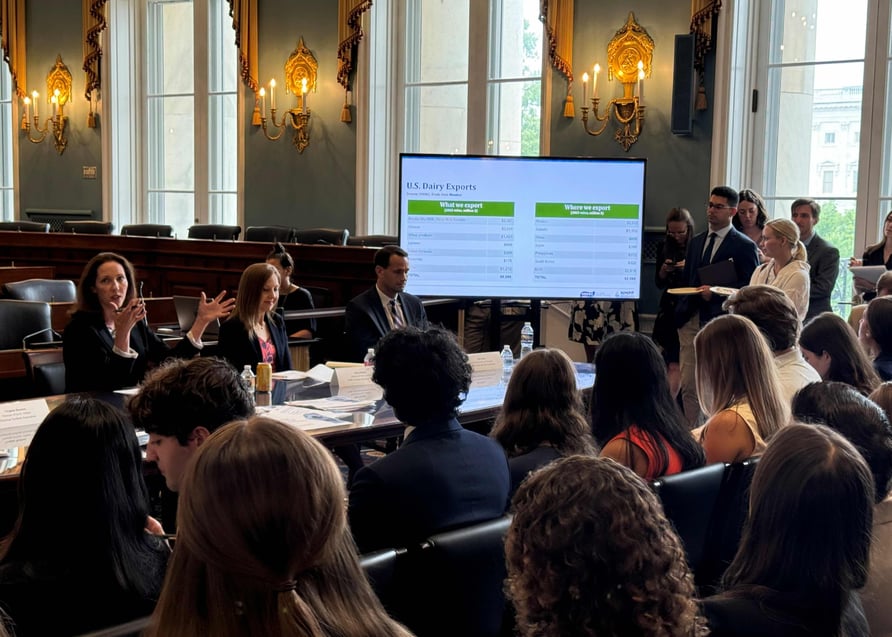
Shawna Morris (top left) outlined the dairy benefits of comprehensive trade agreements to more than 60 congressional staff this week on Capitol Hill at a House Agricultural Trade Caucus briefing.
FMC issues final ruling on ocean carriers’ unreasonable refusal to deal or negotiate
The Federal Maritime Commission (FMC) issued its final rule on its definition of “unreasonable refusal to deal or negotiate with respect to vessel space accommodations” on Monday. A part of the Ocean Shipping Reform Act of 2022 implementation process, the ruling incorporates several recommendations from USDEC and NMPF through the organizations’ two comment filings on the rulemaking.
The final rule addresses several issues that have plagued dairy exporters over the past several years, including limiting ocean carriers’ ability to use prohibitive pricing to discourage export bookings, refusal to negotiate contracts or accept contracted shipments, discriminate amongst contracted shipments and blank sailings without sufficient notice. Additionally, carriers will be now required to file an annual “documented export policy” to the FMC for the agency to weigh a carriers’ unreasonable refusal to deal or negotiate with exporters.
The FMC was responsive to both sets of comments on the issue from USDEC and NMPF, citing the organizations 23 times in both the Supplemental Notice of Proposed Rulemaking in June 2023 and the final rule issued this week. USDEC and NMPF recommendations incorporated into the final rule include a broadened definition for the scope of “vessel space accommodations” to include necessary services to access or book vessel space. The FMC also responded to the organizations’ request to limit the proposed use of broad “business factors” like profitability as justification for refusal. The final decision addresses this concern by removing the broad business factor rationale, changing eligible justifications to specific “transportation factors.”
USDEC and NMPF continue to work with the FMC and Congress to ensure full implementation of the Ocean Shipping Reform Act to ensure a reliable ocean shipping market for dairy exporters. Please reach out to Tony Rice at trice@usdec.org for additional information.
USDEC shares perspective with FFA leaders
USDEC’s Tony Rice joined a panel of agricultural trade association representatives at the State FFA Officer Summit in Washington, DC on Wednesday to discuss how USDEC advocates for dairy trade priorities. The National FFA Organization, formerly the Future Farmers of America, is an intracurricular youth organization preparing its 900,000+ members for leadership and careers in the science, business and technology of agriculture.
Rice joined representatives from the American Peanut Council, Growth Energy and The Fertilizer Institute to share insights with over 300 state FFA leaders on how best the participants can engage their legislators on agricultural issues and how the advocacy process works on Capitol Hill. The “Perspectives Panel” also focused on the current and future agricultural policy landscape and how young leaders can pursue a career in advocacy and policy development.
USDEC advances solutions to address container break-ins
USDEC’s Tony Rice joined a coalition of supply chain service providers on Thursday for a follow-up meeting with Homeland Security Investigations (HSI) to tour the agency’s Innovation Lab in Arlington, Virginia. The meeting is an outgrowth of new Congressional appropriations and the bipartisan Safeguarding our Supply Chains introduced June 28 that would designate funding to HSI to address the rash of intermodal container break-ins that have been impacting dairy exporters.
Dairy exports and other agricultural goods are increasingly becoming collateral damage as organized criminal groups indiscriminately break into containers in search of high-value retail goods. Exporters then are frequently forced to return containers to the point of origin and dispose of the product without the ability to file insurance claims. The collaboration with HSI is focused on using its Innovation Lab as a central reporting location for shippers experiencing break-ins. The Lab would then serve as a hub for collaboration with interagency partners, including the Federal Bureau of Investigations, to effectively police the issue.
USDEC asks any members who have had break-ins to contact Tony Rice at trice@usdec.org for additional information.
Take advantage of U.S. CDE meeting space
The U.S. Center for Dairy Excellence (U.S. CDE) in Singapore is a bustling U.S. dairy home away from home in Southeast Asia. To maximize membership use of the facilities, USDEC has created a booking request form for companies looking to reserve a meeting or seminar room, the demo kitchen and/or workspaces for meetings or activities you may be conducting in the region. Click here to explore availability and booking options. You will need your USDEC username and password to sign in. Please contact Keith Meyer at kmeyer@usdec.org with any questions.
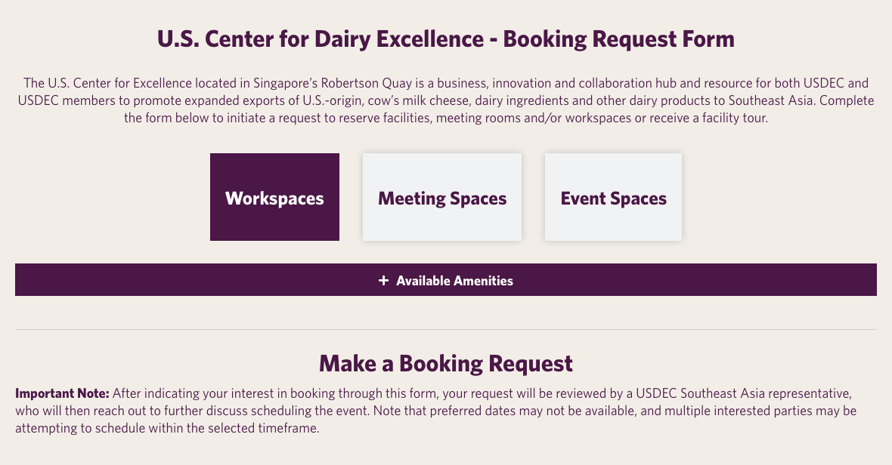
China extends tariff exemption for U.S. permeate for feed
China has extended its tariff exemption for U.S. permeate for feed (protein content by weight 2%-7%, lactose content 76%-88%) under HS Code 04041000. The extension means that qualifying U.S. permeate for feed will continue to be exempt from China’s additional tariffs for U.S. products until Feb. 28, 2025. For questions, please contact Bryan Jacoby at bjacoby@usdec.org.
Mexican ingredient workshops educate more than 300 industry professionals and students in first half
USDEC has been conducting hands-on ingredient workshops in Mexico since late 2020. The 11 workshops held in the first half of 2024 showed that it’s as critical as ever to educate dairy and food manufacturers and students on how and why to formulate with U.S. dairy ingredients.
So far in 2024, workshops have attracted 309 participants. Ten of the workshops (accounting for 288 trainees) targeted food industry professionals in the bakery and Mexican cheese and frozen dessert sectors. The final workshop hosted 21 dairy science students from Tec de Monterrey’s Queretaro campus as part of USDEC’s ongoing partnership with the university.
Long-time USDEC collaborator Ruben Zarraga, dairy science director and professor in charge of the Queretaro campus of Tec de Monterrey, led the dairy sessions. Bakery consultant Gerardo Arena led the baked goods sessions.
“Strong interest in workshops continues,” said Rodrigo Fernandez, leader of USDEC’s Mexico office. “We see high enthusiasm and a desire for knowledge from the bakers, the cheesemakers, the students, the teachers and the importers/distributors who participate. We know the food industry professionals are taking the learnings back to their companies, and students are gaining knowledge they will use as they move through their careers. And we are confident that the workshops help generate greater demand for U.S. dairy ingredients in Mexico.”
More to come
The sessions in the first half of 2024 are just the latest iteration of USDEC’s ingredient workshop series in Mexico. More than 3,200 bakery and dairy R&D professionals have attended the workshops over the previous three years.
More sessions are in the works for the remainder of 2024. Three workshops for manufacturers of native Mexican cheeses are scheduled for Aug. 26-30 in Playa del Carmen. More than half a dozen classes for students, academia, importers and distributors are planned through USDEC’s Tec de Monterrey partnership. USDEC and Tec de Monterrey have not set dates for these latter workshops, but they will focus on cheese and frozen desserts manufacturing and take place at the Tec de Monterrey University dairypilot plant in Queretaro.
In addition, thanks to Regional Agricultural Promotion Program (RAPP) funding, USDEC is extending the program to Central America. These will be native cheese workshops following the same model as those in Mexico. Tentative plans are for Guatemala, El Salvador and Honduras workshops in September, October and November, respectively.

Bakery industry professionals sample baked goods made with U.S. permeate at a June workshop in Mexico City.
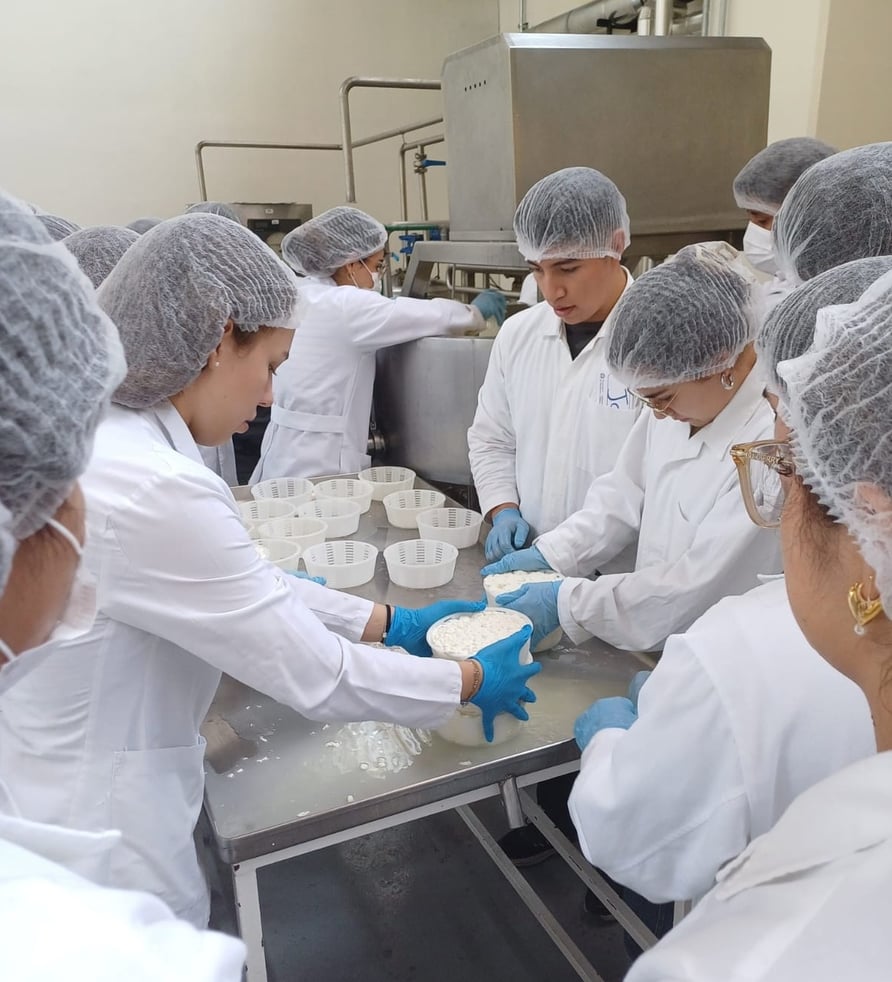
Students package Mexican queso fresco—a fresh, crumbly cheese often used as a topping for tacos, soups and salads—at the student cheese workshop at Tec de Monterrey’s Queretaro pilot plant in June.
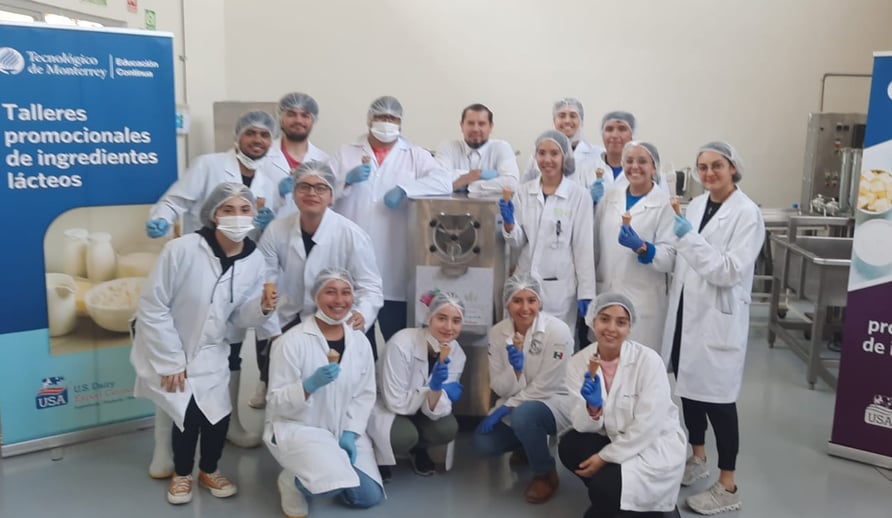
Representatives from Mexican ice cream makers sample the products made during a frozen desserts workshop in Mexico City in February. Instructor Ruben Zarraga is centered behind the soft-serve machine.
Harden talks dairy at University of Georgia
USDEC President and CEO Krysta Harden was in Athens, Georgia, this week, visiting the University of Georgia (UGA) as part of the Advisory Council to the College of Agricultural and Environmental Sciences (CAES). As part of her trip, she met with Nick Place, the dean of the CAES, to talk about dairy challenges and opportunities in the coming years. Georgia is currently the only state in the U.S. Southeast that is expanding milk production. UGA is continuing to focus on dairy science and support of the industry.
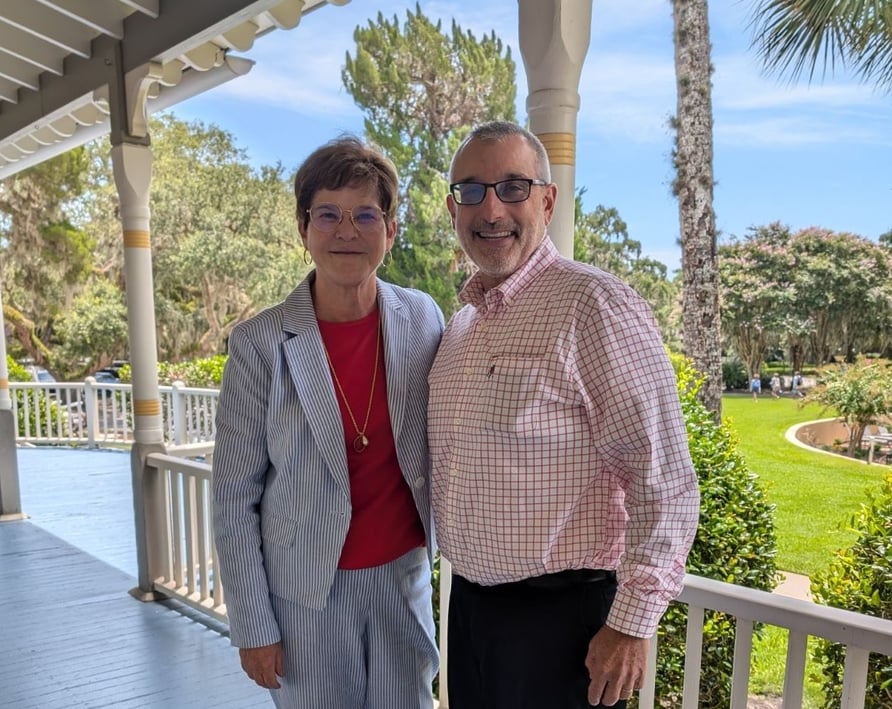
USDEC President and CEO Krysta Harden with Nick Place, dean of the College of Agriculture and Environmental Sciences at the University of Georgia.
Events
Upcoming events in China target bakeries, food and beverage developers
USDEC is participating in four upcoming events targeting bakeries and food and beverage developers in China over the next four months. For more information on any of the following, please contact Annie Bienvenue at abienvenue@usdec.org.
- ATO Shenyang's U.S. Ingredients Bakery Training
USDEC signed up for ATO Shenyang’s U.S. Ingredients Bakery Training on Aug. 23-25 in Harbin, Heilongjiang Province. The ATO is collaborating with the Harbin New East Cuisine Training School to promote the use of high-quality U.S. baking ingredients to 60 students/future bakers. The event includes baking demos with U.S. ingredients and a final bakery product showcase. Chef Dong Han, Liaoning Vocational Technical College of Modern Service, will serve as the instructor for the demos. USDEC has worked with Chef Han last year, who knows and has an appreciation for the benefits of permeate in bakery products. Following the style of past ATO events (see Global Dairy eBrief, 7/19/24), Chef Han will create recipes to highlight the use of U.S. dairy permeate (as well as other non-dairy ingredients from the U.S.) in bakery applications. USDEC members are encouraged to donate permeate samples for this training program.
- Chinese Institute of Food Science and Technology’s (CIFST’s) Convenience Food Conference
USDEC representative Chang Su will deliver a presentation during CIFST’s Convenience Food Conference, August 30 in Kunshan, Jiangsu Province. Chang will cover innovation potential for U.S. dairy protein and permeate ingredients in a variety of ready-to-eat convenience foods. Several of the prototypes developed by the team at Jiangnan University will be featured, and the presentation will demonstrate how U.S. dairy ingredients can “upgrade” and create better-for-you nutritional profiles in a variety of foods. Messaging includes how dairy protein ingredients can boost protein levels while delivering on taste and how dairy (whey or milk) permeate can help to reduce sodium and cost without impacting taste.
- USDEC Training Program for the Bakery Sector
USDEC will conduct a one-day training program created especially for the Chinese bakery sector. The program offers classroom and hands-on instruction for R&D personnel who make formulation decisions, as well as distributors and dry blenders. Two trainings are slated, but the exact dates are yet to come. The first will be held during the week of Sept. 23 in Shenyang, Liaoning Province; the second will take place in November in Guangzhou, Guangdong Province.
- CIFST’s Annual Meeting
USDEC will participate in a sports nutrition session during CIFST’s Annual Meeting Nov. 2-4 in Chongqing. USDEC will use the occasion to remind the audience of the benefits that U.S. dairy ingredients offer to athletes and those with active lifestyles. Messages include how dairy protein can support muscle health throughout all life stages and how dairy permeate can be a valuable natural ingredient for those formulating rehydration beverages. USDEC members interested in presenting or being part of a discussion panel at the session should contact Annie Bienvenue.
Market Summary
Chinese dairy import demand remains mired in June
Year-over-year (YOY) Chinese dairy imports (major products, not including fluid) fell 17% in June, marking the 11th consecutive month of YOY declines on a product volume basis. Most products lagged prior-year volumes, with SMP one of the furthest behind. YOY Chinese SMP imports fell 47% (-13,415 MT). Monthly SMP demand hasn’t been this low since December 2017.
June marked the first time China ever imported more cheese in a month than SMP—a testament to both SMP weakness and steadily rising cheese demand—and instructive of longer-term shifts in the Chinese import product mix. YOY Chinese cheese imports slipped 3% in June but were a solid 16,201 MT—the highest monthly volume of the year.
Other notable results include:
- YOY Chinese low-protein whey imports rose for the first time this year, increasing 6% (+3,246 MT). At 55,531 MT, it was the highest monthly volume of 2024. China’s low-protein whey imports from the U.S. jumped 34% (+7,569 MT) as economic conditions improved in the country’s pig sector.
- YOY Chinese infant formula imports also rose for the first time in 2024, growing 6% (+864 MT). Unlike whey, however, the increase was due primarily to lower volumes in 2023, which exaggerated the year-over-year comparisons. From January-May 2023, Chinese infant formula imports averaged nearly 27,000 MT/month. From June through the end of the year, the monthly average dropped to less than 15,000 MT—a volume level more reflective of strides made by domestic infant formula suppliers and slowing population growth.
- YOY WPC80+ imports fell 20% (-876 MT). It was only the second monthly decline of the year. Year-to-date, Chinese WPC80+ imports remained slightly up (+0.4%, +68 MT).
- Chinese butter demand remains on a roll. Butter imports recorded their fourth double-digit monthly gain in the last five months. Volume increased 21% (+1,831 MT). YOY AMF imports fell 6% in June (-215 MT), breaking a three-month surge in demand during which Chinese AMF purchasing soared 120% (+5,856 MT). But total YTD Chinese butterfat imports were up 9%.
Download USDEC’s latest International Demand Analysis
Global dairy trade over the past four months has been on a seesaw: up in February, down in March, up in April, and now down again in May. Milk solids equivalent (MSE) volume fell 2.3% in May, according to USDEC’s latest International Demand Analysis.
On the plus side, exports to Southeast Asia posted their eighth consecutive year-over-year (YOY) gain, as regional demand continued to rebound after a sluggish economy and inflation significantly undercut demand in the first three quarters of 2023. Southeast Asian purchasing was up across most key products for the month, including low-protein whey, WMP, cheese and fluid milk).
But overall global demand was muted in May, led by ongoing weakness in China/Hong Kong (-22% compared to May 2023). It was the third straight month of declining demand for the region, and no end is in sight. Moreover, the month saw trade shipments stall to the Middle East/North Africa (MENA) for the first time this year. Prior to May, MENA purchasing had posted four straight year-over-year gains, three of them by double digits. Slower sales to South America (-19%) were the final nail.
For more on May results, download the International Demand Analysis.
The monthly reports are packed with charts, graphs and commentary, providing members with a forward-looking glimpse at world markets from a U.S. exporter’s point of view. The report analyzes demand in the key markets for cheese, NFDM/SMP, whey (HS Code 0404.10) and WPC80+, and also includes shorter summaries for lactose, butterfat and WMP. For questions and comments, please reach out to William Loux (wloux@usdec.org) or Stephen Cain (scain@nmpf.org).
Company News
Almarai signs MoU with 30 Exports to boost dairy exports
Saudi Arabia-based dairy company Almarai signed a Memorandum of Understanding (MoU) with 30 Exports, an export house licensed by the Saudi Export Development Authority. The collaboration aims to enhance Almarai’s role in contributing to the goals of Saudi Vision 2030 by increasing non-oil exports and diversifying the national economy's income sources through the expansion of its national products into foreign markets. Almarai CEO Abdullah bin Nasser Al-Bader said the company believes the initiative will “open new horizons for the growth of our exports and achieve future successes.” (USDEC MENA Office; Company reports)
Overseas feed additive projects seeking to reduce methane emissions
Two new feed additive projects are furthering efforts in the dairy industry to lower methane emissions in cows through diet. English retail giant Tesco announced it is partnering with Grosvenor Farms, one of its key UK milk suppliers, to trial a methane-reducing feed supplement. As part of the trial, Grosvenor Farms, one of the original members of the Tesco Sustainable Dairy Group (TSDG), has added the methane-reducing ingredient Bovaer® to the diet of 400 cows. The supplement has been shown to reduce methane emissions by up to 30%. As a result of the enhanced feed, the carbon footprint of each cow is projected to reduce by about 1.3 MT of carbon dioxide equivalent annually. If the four-month trial is successful, Tesco hopes to expand the use of Bovaer® across the TSDG.
In Tasmania, dairy producer Ashgrove began selling a product called “Eco-Milk,” a milk produced by cows fed with seaweed that makes them emit lower levels of methane gas. In February, Ashgrove began feeding about 500 of its cows an oil containing a seaweed extract that co-owner Richard Bennett says reduces the methane released by a cow's digestion by 25%. The product is available across Tasmania at retailers, including Woolworths, with a two-liter bottle selling for about 25 Australian cents more than normal whole milk. The company is gauging consumer willingness to pay more for the product and has not yet decided whether it will expand the project. (Company reports, Reuters, 7/22/24)
Nestlé unveils new technology to reduce fat content in dairy ingredients
Switzerland-based Nestlé announced a new technology it says reduces the fat content in milk powder by up to 60%, which also lowers the calorie levels compared to full-fat milk. The key to the method is the controlled aggregation of milk proteins, where the size and texture of milk fat are mimicked by protein. A company official said the technology was successfully implemented in Ninho Adulto, a popular product in Brazil. The company said the innovation is part of Nestlé’s efforts to enhance the nutritional value, affordability and sustainability of its products and that it plans to roll out the technology across its Nido portfolio globally. (Company reports)
FrieslandCampina sees revenue drop, profit jump in H1 2024
FrieslandCampina revenues decreased by 6.7% in the first half of 2024. The company cited lower milk prices and currency translation effects for the decline. The Dutch dairy cooperative also experienced a 3.2% decrease in milk supply in the first half of the year, which it attributed to the completion of a farmer exit scheme, a requirement by the European Commission following the 2023 finalization of the merger between Friesland Foods and Campina. Despite these figures, CEO Jan Derck van Karnebeek praised the co-op’s “strong start” which includes a five-fold jump in operating profit to €301 million (about US$326 million) compared to the first half of 2023.
Looking ahead, van Karnebeek said the co-op expects to face continued economic uncertainties in the second half of 2024 and that it will increase its marketing efforts in the second half of 2024 to strengthen market positions. (Company reports)
Mergers, acquisitions and joint ventures
Spanish dairy company Capsa Foods purchased a 40% stake in local cream cheese and mascarpone maker Innolact. Innolact, which generated turnover of about €25 million (about US$27 million), is in the process of expanding its factory in Castro de Rei, one of two facilities in Galicia. … Hong Kong-based Ausnutria Dairy Corp. exercised a put option to acquire the remaining 50% share of Netherland’s-based organic goat cheese cooperative Amalthea. Ausnutria Dairy, the investment holding company of Ausnutria BV that primarily serves the Chinese market from manufacturing facilities in the Netherlands, purchased the initial 50% of Amalthea in 2022. … Yorkshire, UK-based food group Regal Food Products Group entered the chilled desserts category by acquiring Lancaster-based premium cheesecake maker Love Cheesecakes. … UK-based materials technology company Xampla announced a partnership with Yili Innovation Centre Europe to deploy Xampla’s nutrient microcapsule technology. The microscopic natural polymer capsules are designed to protect ingredients in beverages from production through digestion, without changing product taste or texture, against degradation risks from UV, pH or heat shock. (Just Food, 7/22/24, 7/15/24; FoodBev Media, 7/18/24; Company reports)
Company briefs
China’s Yili Group opened a U.S. flagship store in Los Angeles that sells Yili brands, including AMBPOMIAL and Youngfun fluid dairy products. The store is located in the Asian supermarket chain 99 Ranch Market and was launched in collaboration with Yili’s U.S. distribution partner Walong Marketing. (Dairy News Today, 7/15/24)
In Case You Missed It...
U.S. Dairy Exporter Blog
Market analysis, research and news subscribe hereUSDEC Twitter feed
Follow us here.